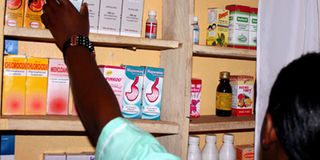Prime
Here is why the same drug may have different prices

A nurse picks a drug from a a shelf. It is common to find the same medicine costing different prices. Photo by Abubaker Lubowa.
Many people wonder why drugs that treat the same disease have different prices. Recently I received a call from one senior citizen, who had gone to buy her prescribed medicines from a drug outlet.
She complained why the dispenser was showing her various products made in China, India and Germany, in addition to their price variations. The senior citizen was disturbed to the extent of thinking that if she bought the ones made in China and India, which were lower in price than the one from Germany, it would not heal her illness.
She further wondered why the National Drug Authority allows imports from Asia, if they say that they are not as effective as the ones in Europe.
This also follows media reports in which a woman sympathised with her neighbour for using cheap drug, allegedly imported from India, Pakistan and China.
It is important to note that like any other business, pharmaceutical companies aim to maximise profit and shareholder value in the market.
The World Health Organisation 2004 framework on access to medicines includes four key areas: A rational selection of medicines, adequate financing, affordable prices and reliable supply systems. In this case, affordable pricing ensures the patient’s ability to pay for medicine of any type.
NDA, just like any other national drug regulatory agency across the world has strict rules that require that both pharmaceutical manufacturers of branded or generic drugs prove that their products are of good quality, safe and effective, and conform to national and international standards. So why is there a difference in prices of similar drugs, intended to treat same disease?
Branded drugs are expensive because of the high cost of research and development that manufacturers incur in the development of new molecules, and most of them are made in Europe, America and Australia. It also takes many years before a final product is authorised on the market. Therefore, the manufacturers are provided some years of protection to recoup their investments before their patent expires.
On the other hand, generic drugs, most of which are manufactured in Asia, are cheap because the manufacturers acquire authorisation from brand product manufacturers to come up with the same drug.
Generic drug manufacturers do not invest in research and development, as is the case with brand drug manufacturers, therefore, making their production costs low, hence the cheap drugs.
Other reasons why generic drugs are cheap is because of the cheap high skilled labour, favourable government policies towards investors in the pharmaceutical industry in Asia, compared to Europe or America.
If drug prices were the same across the world, patients in large parts of the world would not be able to afford urgently needed medications.
Therefore, this does not mean that a drug or certain brand being cheap or made from Asia is inferior, substandard or counterfeit.
NDA is aware that there are some drug outlet operators that try to influence patients to buy certain drugs for their personal business gain, which is unethical.
That is why NDA urges health professionals to be ethical in prescribing and dispensing drugs. To the patients, always seek advice from qualified health professionals in known health facilities, other than resorting to self-medication.
Any drug, despite its country of origin or manufacturer is effective, as long as a person visits a qualified health professional for advice, and accesses medicines from an approved source.
The writer works with the National Drug Authority
[email protected]




